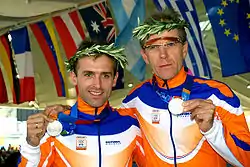A sighted guide is a person who guides a person with blindness or vision impairment.
Sports
Paralympic Games

At the Paralympic Games there are various classifications of athletes with a visual impairment.
Rules are according to the International Blind Sports Association (IBSA) and the International Paralympic Committee (IPC).
The sighted guides are such a close and essential part of the competition, that the athlete with a visual impairment and the guide are considered a team, and both athletes are medal candidates.[1]
Winter
At the Winter Paralympics there are three classifications of athletes with a visual impairment:
A sighted guide is required for B1 and B2, and optional for B3.
Nordic skiing:
The guide can lead, follow, or ski next to the athlete with a visual impairment. The guide assists with voice instruction only. No physical contact allowed.
Alpine skiing:
The start must have an adequate space for the guide.
[3][4]
- Combined
- Downhill
- Giant slalom
- Slalom
- Super-G
Summer

Athletics:
In athletics the sighted guides can win a medal.[5]
Cycling: Pilot
Equestrian:
Football 5-a-side:
Triathlon:
See also
References
- ↑ Visually impaired skiers put fate in guide's hands, thestar.com, March 13, 2010
- ↑ A look at the Paralympic Games, Universal Sports, March 9, 2010
- ↑ IBSA Alpine Skiing rules 2005-2009, International Blind Sports Association (IBSA)
- ↑ Visually impaired skiers put fate in guide's hands, Toronto Star, March 13, 2010
- ↑ Exclusive: Guides to be awarded Paralympic medals at London 2012, insideworldparasport.biz, February 12, 2011
External links
- Being a Sighted Guide, American Foundation for the Blind
- Sighted Guide Techniques, Braille Institute of America
- Video: Guide Running at United States Olympic Committee